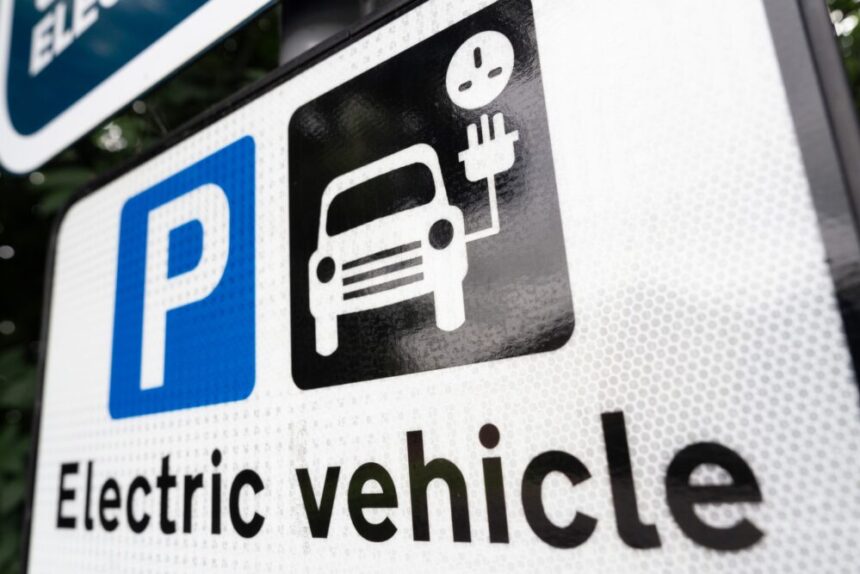The UK’s electric vehicle (EV) market has been steadily growing in recent years, with battery-electric vehicle (BEV) sales leading the way in Europe. However, challenges lie ahead for the market that could potentially disrupt this growth. The recent SMMT Electrified conference shed light on these challenges and brought together industry experts to discuss possible solutions.
One of the key issues highlighted at the conference was the need for the industry and government to work together to address the challenges facing the EV market. This includes more investment in charging infrastructure, flexibility on zero-emission vehicle (ZEV) mandate targets, changes to the Expensive Car Supplement (ECS), and quicker decision-making for government regulations.
The conference also emphasized the importance of providing more support to reach EV targets and incentivize buyers to consider an EV. The Society of Motor Manufacturers and Traders (SMMT) called for flexibility in the ZEV mandate, a reduction in VAT on public charging costs, and addressing the high price of new EVs. These recommendations were outlined in a new report launched at the conference titled “SMMT Electrified: In it together, why every sector wins with EV volume.”
Despite the UK emerging as the leading BEV market in Europe at the end of 2024, registrations have slowed, and the market faces challenges in meeting ZEV targets. An SMMT-commissioned survey revealed that while there is interest in EVs among potential car buyers, many are hesitant to make the switch. The report suggested that reducing VAT on new EV purchases could encourage more buyers to switch to EVs, resulting in significant CO2 savings.
The conference also highlighted the importance of government support in accelerating the transition to EVs. Providing purchase incentives, expanding charging infrastructure, and reducing public charging costs through a VAT cut could help change the minds of electric vehicle skeptics. SMMT chief executive Mike Hawes emphasized the need for all stakeholders to work together to achieve the transition to net zero emissions in the UK.
Charging infrastructure was identified as a significant barrier to purchasing an EV, with consumers hesitant to buy EVs if they cannot conveniently charge them. While there has been an increase in charging infrastructure, the ratio of public charge points to plug-in cars remains relatively low. The UK government has announced investments to expand charging locations and unlock private investments in the charging infrastructure.
Overall, the SMMT Electrified conference highlighted the challenges and opportunities facing the UK’s EV market. By addressing issues such as charging infrastructure, ZEV targets, and purchase incentives, stakeholders can work together to accelerate the transition to electric vehicles and achieve net zero emissions in the UK. The UK government is making strides towards a more sustainable future with the implementation of over 100,000 charge points across local authorities in England. This is in addition to the 680,000 households in England that already have access to a domestic charger. However, there are still challenges that need to be addressed in order to further incentivize the adoption of electric vehicles (EVs) in the country.
One major issue is the cost of charging for drivers without a domestic charger, who rely on the public charging network. According to the minister, drivers with access to domestic charging can save up to £790 a year by mostly charging at home. However, for those without access, the costs can be higher, especially when relying on rapid charging locations. Ryan Fisher, head of EV charging infrastructure at BloombergNEF, highlighted the potential savings for drivers with a domestic charger compared to those relying on fast charging, emphasizing the need for more affordable options for all drivers.
Another challenge facing the UK’s EV market is the addition of vehicle excise duty (VED) to models from April 2025. Currently, all-electric vehicles are exempt from this tax, but from April, vehicles registered after 31 March 2017 will have to pay an annual fee. The Expensive Car Supplement is also a concern, as it adds additional tax to vehicles costing £40,000 or more. This could impact the affordability of EVs, especially for consumers looking for larger family vehicles.
Incentivizing the market is crucial to driving the adoption of EVs in the UK. The industry is calling for more flexible regulations, including the ZEV mandate, to support continued investment in the rollout of zero-emission vehicles. The speed of decision-making is also important, as quick and effective communication and enactment of policies are needed to support carmakers and encourage consumers to make the switch to EVs.
Overall, while the UK’s EV market has the potential to lead Europe, there are challenges that need to be addressed. By addressing the cost of charging, adjusting tax regulations, and incentivizing the market, the UK can continue to make progress towards a more sustainable future. The electric vehicle (EV) industry is growing rapidly, with more and more consumers choosing electric cars over traditional gasoline-powered vehicles. However, in order for the EV market to thrive, the industry needs support from both the government and the private sector. Changes to costs, the charging network, taxation, and more are necessary to ensure the success of electric vehicles.
One of the key areas that needs attention is the cost of electric vehicles. While the price of EVs has been decreasing in recent years, they are still more expensive than traditional vehicles. In order to encourage more consumers to make the switch to electric, the government and private sector need to work together to offer incentives and subsidies to make EVs more affordable.
Another important aspect of the EV market is the charging network. In order for electric vehicles to be a viable option for consumers, there needs to be a widespread and reliable network of charging stations. The government and private sector should work together to invest in the development of charging infrastructure, making it easier for consumers to charge their vehicles wherever they go.
Taxation is also a key issue that needs to be addressed in order to support the growth of the EV market. Currently, electric vehicles are subject to lower taxes than traditional vehicles in many countries. However, in order to further incentivize consumers to choose electric, the government should consider implementing additional tax breaks for EV owners.
Overall, it is clear that the EV industry needs support from both the government and the private sector in order to thrive. By making changes to costs, the charging network, taxation, and other key areas, the electric vehicle market can continue to grow and become a more sustainable and environmentally friendly option for consumers. It is crucial that these changes are implemented sooner rather than later in order to ensure the success of the EV market.







